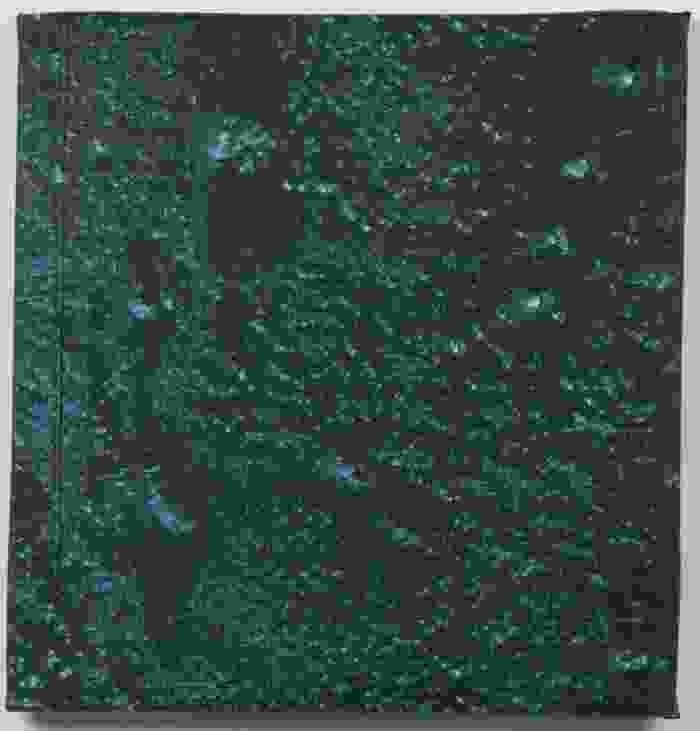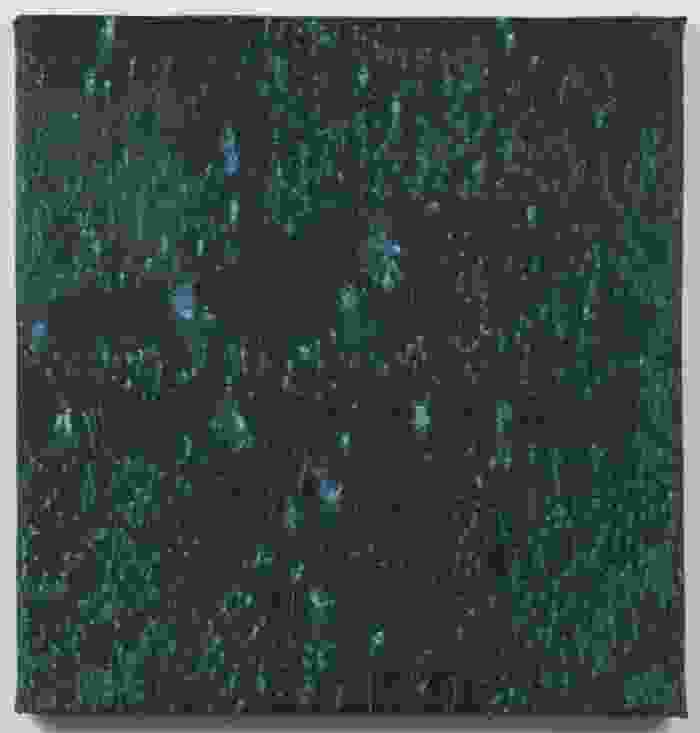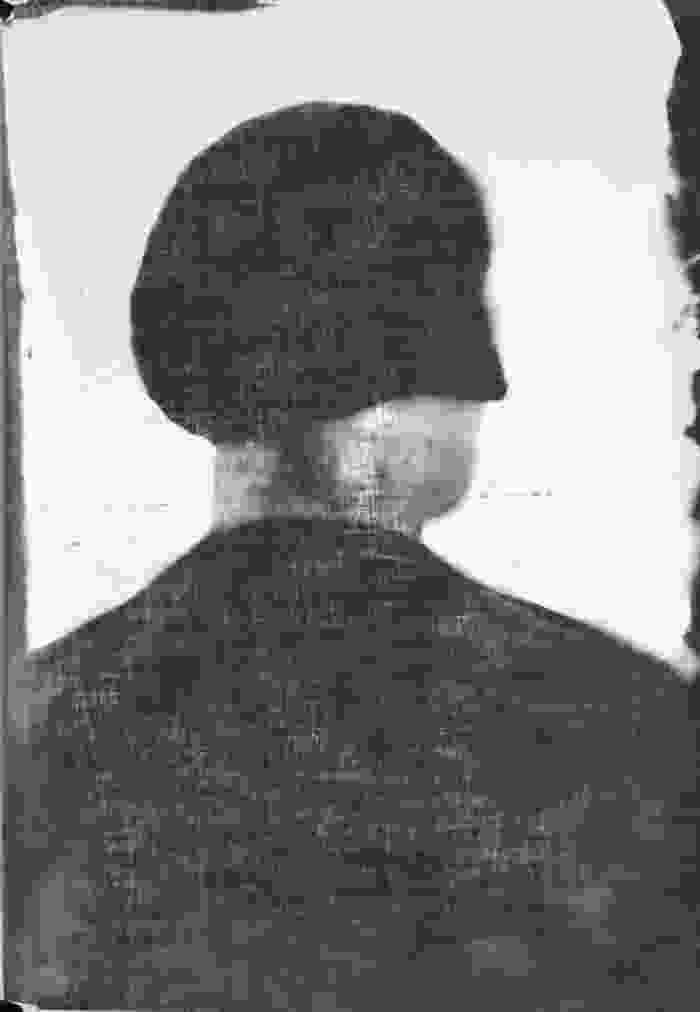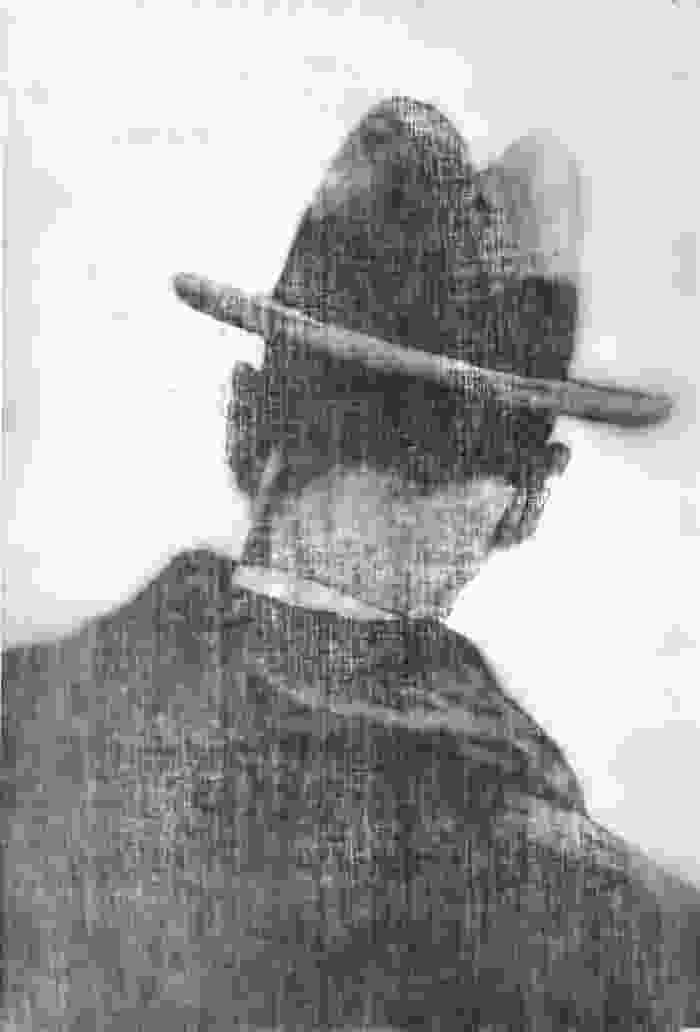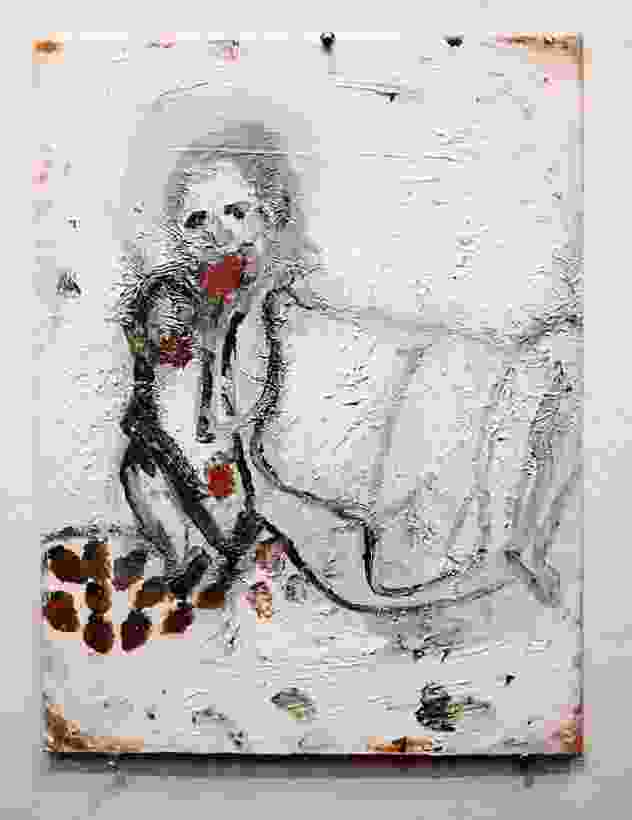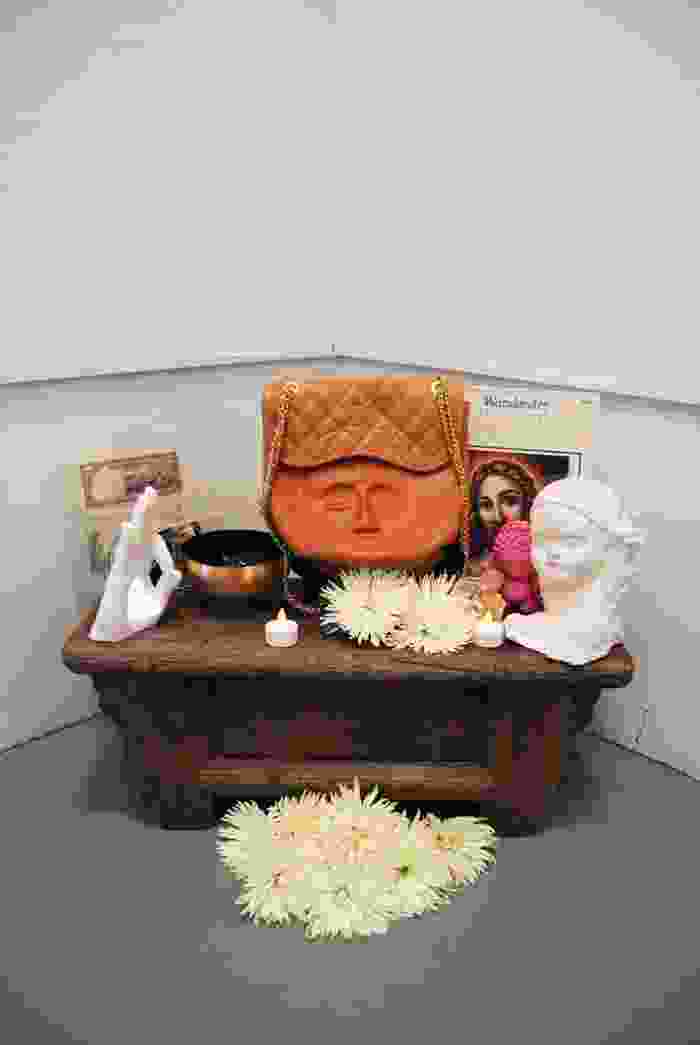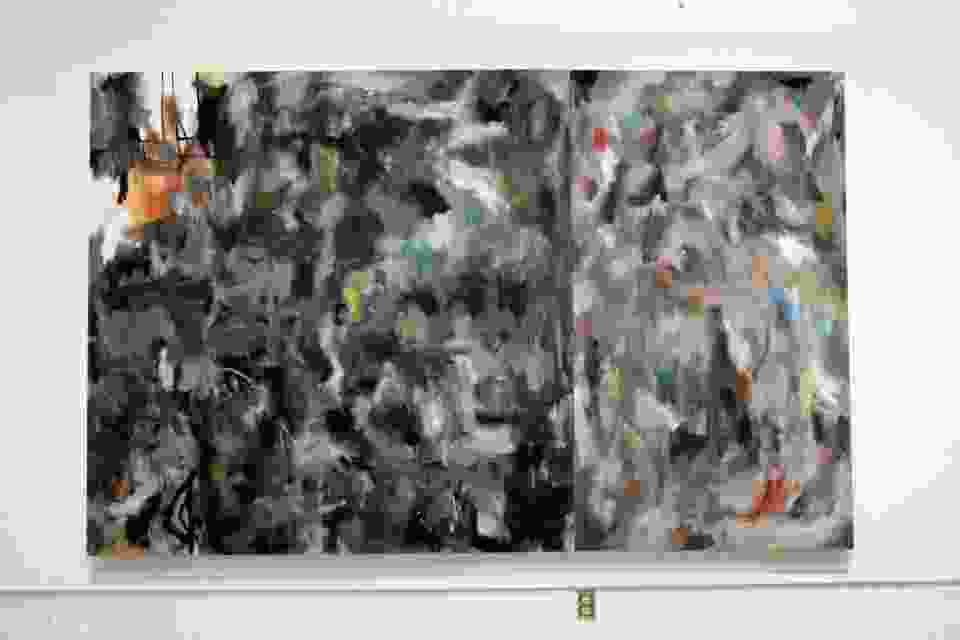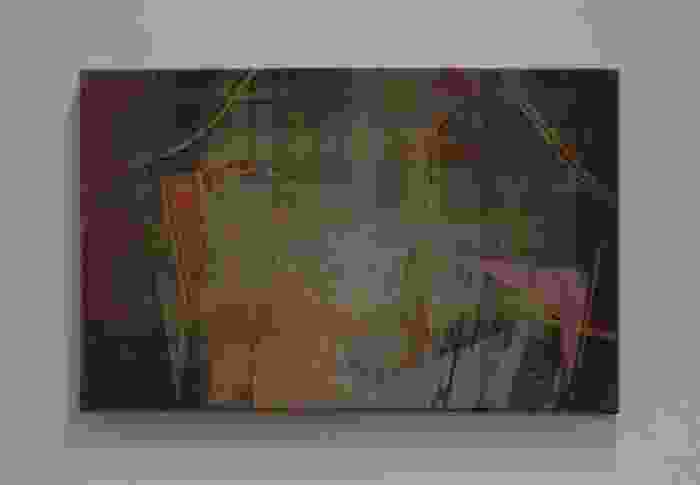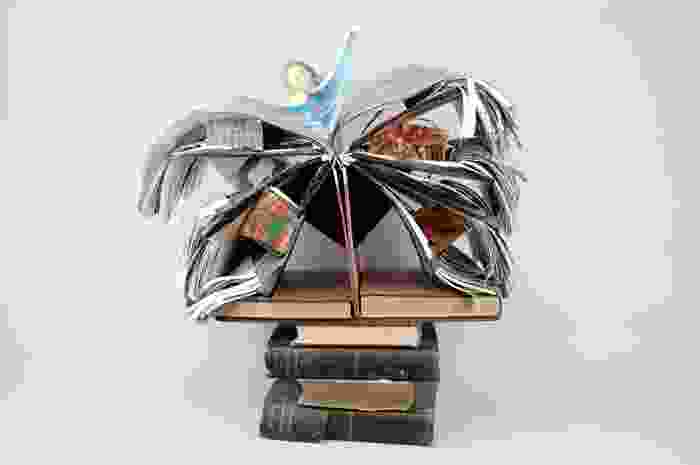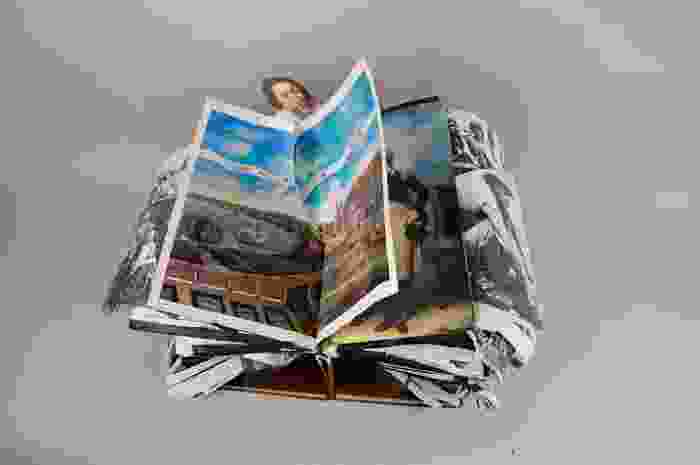Commencement 2012 Issue - The Harvard Advocate
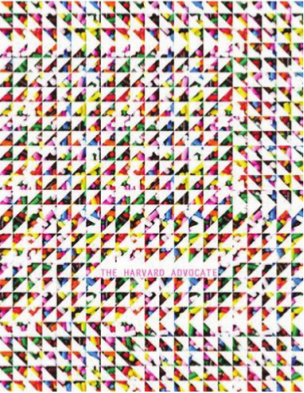
Poetry • Commencement 2012
This is not
nature—the way
pain interrupts
its answers, ashen
awl-tipped
limbs waving
and brushing them-
selves, chill crushes
carried across
the ravine; and
a wing of
their broken flutter,
that desiccated
battle-din, is
hooked by a frosty
steam, and it balds.
Though the awls are
hollow-point—the un-
graspable locusts
having left
behind veins of shadowy
larvae inside them.
And the hollowed-out
scent of cold rain. And
suddenly—a corridor
of ropy light
twines round
the stems and
fills those absent
bodies with steamy
voices they cannot
share, cannot
reveal, retaining
a skin that shields
unerringly—And so
the sudden remains
only as an answer
the stilled silk
flowers
prod-up to reach
on this dog’s grave
(what symmetry
can gather itself
entire, in the
open air?)—a calm
tended to by
the wrinkled spines of
shucked chestnuts.
I would invoke
the radiance of the mirror
uncovering itself
inside the glistering
jetsam-spread of leaves, or
the receding waves of
these flowers, fathering
the dusk into them.
Poetry • Commencement 2012
Walking from where
eternity starts
eyes ahead
you circle it
how brief in noon did you bend to the eyeworn field washed with the dirt of sunlight, hold your breath as if to harden, ungleam, end into leaf, but you did not and sniffed the burngold air you stained, and passed on, leaving the field attentive, opener, as if it were suddenly the absence complementing a gone body and the snow starts shh
*Fremd bin ich eingezogen,*
*Fremd zieh’ ich wieder aus*
A pace, a tread which says we will get nowhere but continue, a hymn living in the church of its tone, wandering, to fall exhausted into God’s lap
* *
*Nun ist die Welt so trübe,*
*Der Weg gehüllt in Schnee.*
* *
In the snow, in the woods, with not much moon, there are no shades of sound but terraces of it, precise as how glass shatters, and the wanderer’s steps, having been absent forever, speak. An overtone of the fact of this heartbeat is a melody like a faithful translation of past hope into the inevitable present pulse which goes nowhere and is true enough as to seem never to have started, always to have measured its minor syllable, a dragged foot long, through the snowreadied field which waited for it, the road like an abandoned attempt at exactly this. And the thought takes shape
*Ich kann zu meiner Reise*
*Nicht wählen mit der Zeit*
The way even this steamed mercuryline of song was long constructed by the cold, by the drying white throat of silence which oriented, at your steps, toward the hot black pupil of you. And what you give
words to had just
been said un-
-translated, I cannot
pick the time, then
you were propelled
up
to speak
*Muß selbst den Weg mir weisen*
*In dieser Dunkelheit*
But the way is already found and you sing to show the darkness a perfect darkness. Which does not lighten but keeps you a breath’s length from the world, where speech is. But farther, from the distance of music or the eye’s blackshone core, it is all unreal enough to be gray. But you find nothing. You dip yourself in brighter black so you will be lost and the same hand which mouths your words before you pour the hearthsmoke of breath into them will plot unfeeling the path you will feel.
*Und auf den weißen Matten*
Who hunted the deer whose tracks hunt and predict you
*Was soll ich länger weilen,*
*Daß man mich trieb hinaus?*
Here there is no away to be driven. For passing your hand through the tones around black as through shades of water you pass through black again, so that black comes to be only where you walk from and where, you keep remembering, you are going. The farmhouse is an accident, the gold of its eyes glancing away and going out, a face, did you call for it? You cannot fix its gaze.
That the modulation from minor to major is the most painful one. Achieved by wincing into surplus a pool which accumulated,
unnoticed,
to brimming,
nightlong. The listener’s face is loose, open, and the eyes blacken and wet to match the dark or breathe in it, the cheeks hang around the set jaw of the minor third. And it expands and the listener cracks into an
instant of
smile, that
shatter and
diminuendo
of ache, one streak
of exiled sunlight. How much he smiles through. The pool spills.
*Will dich im Traum nicht stören,*
*War Schad an deiner Ruh*
I could not disturb
your dreaming you will
not hear my steps
The door touches
the frame and makes dark and
I wake and start
wandering and
I write, above, good night, no, there is
no above night, I write
good night out of night’s
ink on night’s
fabric so you will know
I thought of you, no so
my breath pads the black
Poetry • Commencement 2012
The jet-drone of the river
is deafening, shocked metal
on sheet of black glass, the rotator
a shriek of rattle-heat, power
into motion, limbs blown
back. High above, flock of shrikes,
dark ornaments in branches
leafless, bleached—
a botched dividing, scrawled
before winter, before
freak fractals of snow,
before the fracked earth
shatters far beneath.
I am but factual. Higher,
in the black, unblinking
light of actual aircraft, of flight
quiet as vectors. But up there nothing
moves: is it Venus, is it some star’s
last siren, the workday over,
compression over, light’s
factory-whistle and called up years ago
I am with you flying on aluminum wings
of no one’s making, black cows like rivets
gridding the brown field below,
ice sheathing spiked turf,
sharp-tip, stalk, flat-feather—
from soil these thousand beaks
hissing. We enter an eddy
of cloud, the world
whitewashed away,
as outside us the hum grows,
pale, hard, coiled,
like a goiter in a bull’s throat.
And is it in me now—
muttering, all sides
the heavy, engined river,
a hand dark as thirst raw
on my tongue,
when I am numb, when I
am held down,
when my eyes blow
open: again the nerve the startle
the lurch of lift-off.
Poetry • Commencement 2012
Leaf carried
left. Brittle-cold grass, where I want to insert
first the asphalt, first the rain
thawing on the brick. Silence unfolds
its loud mutterings.
Pierced by a cry. Black bird,
yellowed beak. Not pierced,
threaded. Bird finds the grain
of the still air, slips a voice through
and between the layers. First sees
the layers. Soon the instant
when the falling water is only
what falls from branches, edge of
gutter, off the leaves.
Taps on the hard grass.
New silence after
this one. I plucked a smooth
green needle from a low-hanging off-shoot,
the branch leaning in to me as if to hear
more clearly. Pulled bowstring.
The needle: flexed it between two fingers,
folding it in half. Pressed it between two teeth,
convex side down, flattening its slight
curvature. I would have closed my eyes
to do it more carefully.
Features • Commencement 2012
The caravan was burning. What would later be called a tragedy was still, for now, just a fire. With a flicker of orange and a tiny *pop *the paper celluloid flowers burst, sold so cheaply and aflame so easily. These would not make it to their marketplace, the Parisian cemeteries. Django was late coming back from a gig, so his wife Florine had stayed up waiting. She distracted herself with her work.
How banal are the beginnings of disasters: a guitar discarded on a table; a hand rising fatigued to a forehead and then back to the table in a gesture never completed. A candle knocked over and a world alit.
The caravan burned—the lace curtains curling up and gone, the cast-iron stove swallowed in a bang—but Django and Florine would emerge alive though not unscathed. Important possessions were lost: a guitar, three suitcases, some rings. A small wardrobe and two charred fingers. It was 1928 and Django Reinhardt was eighteen, married, Manouche -- a French gypsy. He lived in the outskirts of Paris among other Manouche, also called Romani, and he played a secondhand banjo-guitar.
Music was his livelihood and had been since he was thirteen. *Musette *was his preferred style: a form traditionally played by gypsies that had begun to gain currency in French dance halls beginning in the 1880s. By World War II it had become the most popular dance style in France. It also proved attractive to those upper-class rebels itching for a way out of boxed-in waltzes and ballroom steps. More daring Parisian élites began to turn to smaller, smokier establishments in the Latin Quarter, like Django’s on Rue Monge, where Italian Gypsy Vetese Guérino had agreed to mentor the budding young musician.
2010 marked the centenary of Reinhardt’s birth. It was celebrated by a plaza created in his name in Paris’ 18th arrondissement, where rue Binet intersects the Avenue de la porte de Clignancourt—approximately at the site of the burning caravan. Today he is hailed as the only European to have reached the level of Louis Armstrong and Duke Ellington. He was the European star of jazz. At the time, though, the fire in his caravan left him with severe burns on his right side from knee to waist, which would require over a year of recovery. In addition, the fourth and fifth fingers of his left hand were mutilated. The doctors said he would never play guitar again.
It is more precise to call Django Reinhardt the European “king of jazz,” as *Le Monde* once dubbed him, rather than a merely French jazz star. Reinhardt’s entrance into the Parisian music scene was due more to chance than to intent. He was born Jean Reinhardt, in his parents’ caravan in Liberchies, Belgium, the Romani patron saint Sara-la-Kâli perched on the center wall. The family spent some time in Paris when he was quite young, but after his father abandoned the family, the mother led him and his brother through Nice to Italy, from Corsica to Algeria, before making their way back to Paris. In this his story mirrors that of many other Romani, and of the Romani people in general, condemned to an itinerant lifestyle for nearly a millennium. They are believed to have originated in India, according to linguistic connections between the Romany and Sanskrit languages. Scholars speculated that they originally formed part of an army of lower-caste Indians, engaged to battle Muslims led by Islamic leader Mahmud of Ghazni, when he invaded India in 1001. Some survivors migrated westward, some to Europe, some to North Africa. Europeans, believing their origin to be Egyptian, called them “gypsies”. European folklore claimed that Gypsies had forged the nails to crucify Jesus. Beginning in France in 1427, they were systematically expelled from European kingdoms, though less frequently granted special status as a people.
Historians have since traced the Reinhardt clan to 18th-century ancestors based in the Rhine River valley. Wanderers like the rest of the Romani, by necessity rather than by choice, his grandparents were forced westward by the Franco-Prussian War. Django Reinhardt, then, held no great patriotic pride for his adopted homeland of France, even as classified as a specific type of gypsy: Manouche, or French Romani. Where then to turn? Manouche poet Sarah Jayat put it succinctly in 1961, in her poem “Django”:
Django
Like us
you have no king
no set of rules
but you have a mistress:
Music
The musician slipped out of the national *musette* craze without a great struggle, once his accident made those brisk dancing chords impossible. His father had been a professional player of violin, guitar, and piano, touring through Belgium to Corse and Italy, and so the strains of these and of the accompanists’ instruments, the banjo and drums, had framed his son’s earliest memories. Django returned to this in convalescence before stumbling upon the new if remote phenomenon of American jazz. Louis Armstrong’s “Dallas Blues” opened the floodgates, followed by Joe Venuti and Billy Arnold’s Novelty Jazz Band. He was particularly struck by Eddie Lang, born Salvatore Massaro in Philadelphia at the turn of the century. Lang’s pioneering guitar style, melding a flatpicking rhythm with a bluesy lead, helped to establish him as the first major jazz guitarist. It is quite likely due to him that Reinhardt abandoned the banjo almost entirely, in exchange for the possibilities of the guitar.
Yet a not insubstantial hurdle remained: how to reach the level of his Yankee contemporaries with three-fifths of a right hand. (Critics have never agreed as to what extent the charred fingers were usable, if at all). It was probably inevitable that a new type of music emerge from this arrangement, though its popularity was hardly a given. Jazz scholars speculate that Reinhardt began by using his two functional, curled in fingers to fret notes on the upper two strings—B and E—while he abandoned fretting notes with his burnt fingers entirely, or used them just to play chords. His left hand often muted strings that went unused. Reinhardt only rarely played standard major and minor chords, exchanging them for minor 6, major 6, and major 6/9.
A surprising variety burst forth. “Minor Swing” is a fast-paced jig with a solo characterized by string bends and pull-offs, while the classic “Nuages” (‘Clouds’ in French) shows off his digital dexterity. His phrases tended to rise and fall, ascending over E7, descending over Am6, but ending in a different way each time—improvisation changed up the patterns. Reinhardt mastered what jazz musicians call “encirclement,” approaching a specific chord tone from the chords around, creating chromatic interest for each phrase.
This was all mostly idle practice, though, at least for the first few years. Things began to change in 1931 upon a fateful meeting with violinist Stéphanie Grapelli. Grapelli was working in the cabaret scene, taking on gigs for films as a pianist when he needed the extra cash. The two began participating in informal jams together, each finding in the other an ideal complement and a companion in musical taste. Their relationship solidified, the two took their partnership to the next level, establishing the Quintette du Hot Club de France in 1934. Reinhardt’s guitar and Grapelli’s violin sloughed off the need for drums, horns, or piano, which up to that point had been a standard in jazz tunes. Instead they dreamed up *la pompe—*the pump—to give percussive rhythm to their songs. The two rhythm guitars played fast up-down strums followed by a longer down strum, setting a background beat for Reinhardt’s melodic yet still free-swinging phrases.
Traditional Gypsy music found its way into the Quintet, inserting chromatic runs and note embellishments played with a varying rhythm. Mixed with African-American “hot” jazz’s elaborated chord forms, bass lines, and percussive pulse, the new “gypsy jazz”—*jazz manouche *in France—struck a minor then major chord in the Parisian jazz scene. Their gigs began to rack in the highest ticket prices throughout Europe: Louis Armstrong, Duke Ellington and Dizzy Gillespie were among the Americans lining up to record or play with him. Reinhardt and Grappelli continued to perform together up until September 1939, when Hitler’s invasion into Poland led the two to cut short a London tour. Reinhardt returned to Paris, where he believed he would be safer at a time when Romanis were being targeted by official Nazi policy, less systematically than Jews but substantially all the same. Yet when the city fell to the Germans, Reinhardt stayed. His recordings and performances became a kind of loophole allowing him to escape ethnic “purification.”
In occupied France, jazz was officially banned. But an underground record industry continued to boom. The titles of jazz records were often tweaked to hide their origins. Luftwaffe officer Deitrich Schulz-Kohn, known as “Doktor Jazz,” was only one of many German officials to cultivate a not-so-secret admiration of Django. He helped Reinhardt secure gigs throughout Parisian clubs, sometimes bringing along his German comrades. Photographs from the time reveal a slightly jarring image of German soldiers listening enraptured to a Gypsy artist, whose compatriots were perhaps simultaneously being hauled away in cattle cars. “It was really a golden age of swing in Paris,” Michael Dregni, author of the biography *Django, *has said in an interview, “with these gypsies living kind of this grand irony.”
While Boris Vian is best known today for his novels, the French polymath’s one consistent avocation was that of jazz. Born in 1920 in the well-off Parisian suburb of Ville d’Avray, Vian was involved in the Parisian jazz scene starting in 1937, when he began to play the trumpet and joined the Hot Club de France. He later played in a band with musician Claude Abadou, serving also as conductor at Tabou on Rue Dauphine, or at Club Saint-Germain on Rue Saint-Benoît. His novels (though widely lauded today) were initially met with little enthusiasm and a lukewarm critical reception, leading him to throw himself back into the jazz scene, where he continued to play and critique.
Indeed, Vian’s literary side gave him a unique angle from which to deconstruct the allure of jazz in France. He himself was hardly a sober-minded critic: he was apt to wax adoringly of Django Reinhardt among others. In one of his reviews, he wrote, “There are only a few French musicians who are of an equal class as the great American soloists. Django…is one of them.” Yet he also made an attempt to undress this mystique.
For the un-indoctrinated masses, Vian wrote in January 1948, jazz was merely the next catchy rhythm, suitable to be paired with a dance for eagerly awaiting youth. For a certain type of child, it could be a snub in the face of more straight-laced parents. It could also, though, serve as a sort of societal metaphor. A materialization of the good life, Vian called it, with all the rules of etiquette bored into any regular cinema-goer: “champagne, whisky soda, plunging necklines, furs—and twenty handsome musicians beating out a refrain, whose words the heroine murmurs half an inch from her beloved.”
In this sense, then, jazz was no longer a counter-culture or a sub-culture, something to react against or to. It became something to aspire to: just as Parisian élites hauled *musette *musicians out of their underground dance halls, the expansion of jazz unearthed a musical trend, dusted it off, and framed it prettily.
But it was more than this for some. Vian, a purist at heart, considered the noblest followers of jazz to be those who shed the social or cultural trappings surrounding it, yielding only to the sound. Reinhardt, to him, was among those seduced solely by the cascading rhythms and jangling chords of jazz, touched “by the senses, by its intelligence…but who seek to deepen, to understand, to acquaint themselves with it.” Vian admired Reinhardt as one who learned to extract from jazz its true substance, remaining faithful to it as a form, rather than as another sub-cultural trend. In this sense Reinhardt would not be the social warrior that some have tried to make him into, striving to re-appropriate an identity that history had so often trampled upon. Reinhardt was hardly against the popularization of the form he produced; but at the same time he tended to treat it rather myopically, in his intense fervor for the music. “Wine, women, and song,” wrote his biographer Pregni, summing up Reinhardt’s central preoccupations. There was to be no chromatic progression into music’s social ramifications.
And yet at the same time gypsy jazz *can* be said to frame a certain mood, urban if not national. The Paris of the thirties was beset by intrigue and uncertainty, a more measured follow-up to the glee of the twenties. This was coupled with the music scene’s tentative but eager improvisations and experiments. Gypsy jazz twisted all this together with a mix of Romani and American strains, rolling out the red carpet for another postwar trend—rock & roll. Artists from BB King to the Libertines would cite or cover Reinhardt. Some have gone so far to call him the most eminent guitarist, under the headline of “pre-rock & roll.”
If Reinhardt’s legacy is rock and all its endless permutations, the gypsy jazz form itself has trickled down to the present via different routes. The scene today hovers between mainstream and underground, emerging for events like the centennial of Reinhardt’s birth before dipping back down once again. Saint-Ouen, where his caravan was parked, is home to several bars with *jazz manouche *leaking out the windows. L’Atelier Charonne and other places around Rue Oberkampf have lent a squeakier sheen to the form, surrounded by young grungy-hip nightlife, and charging fixed prices for dinner and a show.
On a recent Tuesday night, Rodolphe Raffalli was playing at the Piano Vache in the fifth arrondissement. An institution in the contemporary Parisian jazz guitar scene and a sworn devotee of Reinhardt, Raffalli is heavyset with a sober expression and a ubiquitous post boy cap. He arrived with a partner to play the percussive drum-less background that Reinhardt dreamed up. Posters blanketed the dark oak walls of the venue: “Django: 20 ans forever” or “Death in June: 30th Anniversary Tour.” Patrons shot shot glares at those who whispered or shifted position too loudly. After Raffalli’s first crescendo’ed arpeggio the audience broke into applause. His phrases flowed into each other, though every so often shaken up by an errant twang. An energetic song was followed by a more tranquil one, with a pause between, as Raffalli wiped his brow and replaced his pick, red for yellow.
The crowd was not young but not old, the average age hovering around mid-thirties. It was a crowd that knew music, or at least *jazz manouche*, or at least knew that this was worth knowing. There were no furs in the audience or champagne flutes; plenty of skinny jeans and dark t-shirts, however. When it was over there was that one frozen moment, as there is always, as the lights switched back on, before anyone tries or wants to move. A crowd began to gather outside and cigarette smoke gathered around it. A Subway sign flickered wanly across the street and Raffalli prepared to leave, the *manouche *arpeggios barely lingering as he snapped his guitar case shut.
Features • Commencement 2012
Elegies of writers often tend toward the bombastic, but it would not be an exaggeration to call Adrienne Rich one of the poets who mattered most to the twentieth century. Dedicated to poetry as a form of urgent discourse and committed to prioritizing a vision for women, Rich pushed the boundaries of both her poetry and her activism.
Rich was born in 1929 in Baltimore, Maryland, the daughter of a former concert pianist and a doctor whose “very Victorian, pre-Raphaelite library” she devoured. Although she won the prestigious Yale Younger Poets’ Prize as an undergraduate, she did not immediately pursue her poetry as a professional, publishing only one follow-up volume while starting a family with her husband, an economics professor. When she published again in 1963, her poetry had become more vibrant and complex, beginning her tendency toward freer verse and livelier spirit that would only increase throughout her long career. Both a participant in the women’s movement of the 1970s and one of its chroniclers, she captured in her poetry the kind of stifled rage that pushed feminism to its peak. The issues of American intervention, the future of the arts, and the public role of the self formed a backbone for much of her later writing.
At Harvard, Rich studied English. She became friends with fellow undergraduates Donald Hall and Robert Bly, with whom she double-dated. But Harvard was not totally welcoming—as a woman, Rich could not enter the Lamont Poetry Room or become a member of the Advocate. “From 1947 to 1951, when I graduated,” she would later write, “I never saw a single woman on a lecture platform, or in front of a class, except when a woman graduate student gave a paper on a special topic. The ‘great men’ talked of other ‘great men,’ of the nature of Man, the history of Mankind, the future of Man; and never again was I to experience from a teacher the kind of prodding, the insistence that my best could be even better, that I had known in high school. Women students were simply not taken very seriously. Harvard’s message to women was an elite mystification: we were, of course, part of Mankind; we were special, achieving women, or we would not have been there; but of course our real goal was to marry—if possible, a Harvard graduate.”
A sense of restraint is visible in her early poems, three of which are reprinted on the following pages from their original Advocate publication in 1950-51. Much of the writing is quiet and formal; it seems to echo Rich’s early influences, such as Robert Frost. Her verse, though evocative and lithe, is marked by a controlled and formal precision. As he praised her poems as “gently and modestly dressed,” Auden just as graciously noted in his introduction to the Yale Younger Poets’ Prize that her pieces “respect their elders but are not cowed by them.” Rich was consciously attempting to fit her voice into the model that had been given to her.
Yet Rich’s early poems are striking in their urge to discover what lies beyond the limits. Each line pulses with the recognition that something does lie beyond: a “whisper of a shade,” a “live thing” shivering, an uneasy moth exploring the “edge of light.” Her pressurized pentameter holds an energy that will eventually burst in her later poems, propelling her style beyond its metrical container. Rich’s Advocate poems are harbingers of her career to come.
Years later, when Rich wrote “Twenty-One Love Poems,” an expansive series describing her relationship with another woman, the same voice appears to move more freely. The female of Rich’s poetry is no longer confined to her dark room. Instead, she asserts her identity, walks an astonishing spectrum of pleasure and pain, and stands in life’s direct path. The uneasy moth near the night-lamp is gone, replaced by a narrator who is ready to declare: “I choose to be a figure in that light.”
Features • Commencement 2012
The spring break of my junior year of college I spent entirely at home on Avenue R, while my mother and father were at work and my brother was at school. I was thinking Big Thoughts over that spring break: I had brought a shoulder-bag full of books home, many of them hardcover, stuffed between two pairs of jeans and my baseball glove. I wore my own jeans and my brother’s t-shirts, that week. We had become the same size, nearly exactly, leveling off around maturity. Our shoulders, in the mirror, were the same width.
That week was the week after the tsunami wave and earthquake in Japan, when three nuclear reactors suffered a partial meltdown. I had about fifteen books to read that I knew with only a small sinking feeling I wasn’t going to finish. There was a price to be paid for every book gotten through, and that price was 60 minutes for every 60 pages read—at best—meaning that each paperback stacked in my blue bag was a collection of solitary hours that I had no choice but to attempt. I had recently read an essay by Jonathan Franzen in which he said that he had come to the realization that he would read only a finite number of books in his life. He’d calculated that finite number, and at his stage in life it was a three-digit one. I hoped that mine was an order of magnitude more than that, but still, the tangibility was weighing.
My brother was a senior in high school then and it was his last for-sure baseball season, surely the last that I would be able to watch with such ease, considering the difficulty of making a college baseball team and the by-no-means guaranteed proximity of our schools during the brief spring season. That week he had a game every day, so my schedule revolved shadow-like around his actions. I took the train or drove into the city to watch him warm-up. I’d sit on the bench and talk to his coach, once my own coach, while he played. I watched him lean forward too much on first pitches, anticipating fastballs. He was hitting third that year. Sometimes he struck out and sometimes he got hits through the hole between short and third. He had become in my absence a quite remarkable fielder.
Then at nighttime I would eat dinner with the family, go upstairs and help my brother with his calculus homework, try to concentrate on something like reading or internet television while my slowly-deafening father listened to too-loud television in the living room, wait until everyone but my mother was asleep, when we would watch “The West Wing” on my laptop at the kitchen counter, and then even she would drift off and the house would be mine, except for my father’s coughs, and every once in a while when my brother got up to go to the bathroom.
I was thinking Big Thoughts over that spring break. It felt then like one of those threshold moments, when the world asks of you what the rest of your life will look like: summer jobs, no summer jobs, graduate school applications. My computer was slowly dying that spring break. The Genius Bar people said it was only a matter of time. It was leaking power. This turned my attention to the appalling emptiness of my bank account. I conjured up and rejected various get-rich-quick schemes. I considered application to Kings Highway Car Service before remembering my sense of direction.
The Big Thoughts were centered around things like reading and writing, which I thought were things I had focal points of understanding for and wished that I could make everyone else see like I saw. I just needed to translate. Questions like, now what *really* is the experience of reading. I looked at old bookshelves that my father had built incorrectly in the last millennium and tried to relive the experience of each and every paperback. I looked at the fifteen unread ones in my blue bag and tried to absorb their knowledge and desire. I chipped away at the longer ones among them, trading clumps of time for their middle pages, forgetting, afterwards, even the characters’ names.
And all along I had nothing else to do on the dying computer but check the news from Japan. Every time I opened my email or watched internet television the news sites began flashing with journalism and numbers from the East. Headlines about the last fifty workers left in the nuclear reactors, battling fire and radiation, shuffling in and out, some to the hospital when they collapsed for no reason and others on the floor dry-heaving, their lungs frozen with hidden fire. There was an invisible pollution seeping through the air, the reports said. There was the regular destruction of ocean-front towns and the shaking of skyscrapers, but also this, fifty workers chosen to remain in gas masks and white radiation suits. Who could say that the world was not at an end?
In *Freedom*, Jonathan Franzen’s book, there are a couple of things that characters keep saying, but one of them that I remember is “so and so didn’t know how to live.” It’s just the way things are. “They haven’t figured out yet how to live.” This stuck with me over that spring break. The way I read books then (still do, it’s ridiculous to refer to this in the far past tense) was to trace little things through them. Franzen was great for this kind of trace. Over the course of the book something became apparent, which was that no one knew or learned how to live.
My roommate had (still has) a whiteboard on his desk. He always insisted on having his desk in the common room, so he could be at the center of everything. The rest of us just wanted to escape. I thought of this at home. On his whiteboard, at the top, it had a little improvised chart for how many miles he’d run on the days of the week. And, included, his goals and personal bests for various distances. 2 miles, it said, question mark? 13:30. 4 miles? 27 flat. Below that it said, “Life goals.” 1. Graduate. 2. Teach back home in California. 3. Teach abroad in Spain. 4. Graduate school of education. 5. Principal. And then 6: Secretary of Education? Next to “abroad in Spain,” he had a questioning squiggly line, off onto a separate column. “Astrophysics?” it said, question mark?
I read a lot of journalism, a lot book chapters, sitting on the Q train into the city. The baseball games started at 4. The sun was at a good point then, baseball-wise, not so high it hurt pop-flies, not gone enough to make shadows. And you could see it, when the train went over the Manhattan Bridge. There’s a moment after the East River as Chinatown disappears above you and the tunnel consumes the first cars, when you wonder if the Q could take you into the future. Canal Street opens to its usual stench. Next stop, you tell yourself, putting the book away.
The final day I was home for spring break was the last chance I thought I’d get to see a baseball game of my brother’s. It wasn’t. I bussed home later that semester, because I didn’t know what else to do, and watched the first round of their playoffs. They won. He hit a double down the fast alley an out-of-place centerfielder and left-fielder make, on a hot day and with a quick Astroturf. Even that wasn’t the last chance. He played over the summer with a local team, the Hurricanes, with a friend of his from high school whose mother had just died, cancer. The kid was going to City College next year. He was going to make the team, god damn it.
That last spring break game, that hadn’t happened yet. The last play of the game, if I remember it right, was a roller to my brother at third. The important thing about those is that you have to take the right step first. I mean you can shuffle on the way, but it better be damn near perfect. We practiced these on the softball fields in the park, better after it rained, so the dirt was wet and smooth, without the possibility of bad hops. The kid who hit the chopper was quick, you could tell when he’d walked up to the plate. The coach of my brother’s team from the bench had made that motion with his hands, a roll of two fingers: wheels. So my brother had to move fast. You have to catch a ball like that on the right bounce. He got it on the long one, didn’t even glove it, just open-handed it, and that was all off his left foot, and then he landed on his right foot and used the torque from that landing to throw.
Now once the ball left my brother’s hands it needed to be moving at 75 miles per hour, or, because he was so close, and I’m being generous, let’s say 90 miles per hour, or 132 feet per second, to get the quick runner in time. Let’s say 50 feet away, and the runner more than three-quarters of the way to first. The throw, at that speed and distance, would hit the glove in less than .45 seconds. This was all through my head while the ball kissed my brother’s fingers, before he leveled his other foot down. Other numbers: 9.0 on the Richter scale, 72.0 sieverts of radiation doses, enough to kill a person in minutes. One book a week, 50 a year, 3,000 left. Quick quick quick, yelled the coach on the bench.
It was a smooth pick, smooth throw. The first baseman stretched and caught it. The ball got there in time, and we all went home. My brother was flush with suspense.
Fiction • Commencement 2012
When I was little the way the shine on the hood of a cool car blinded me made me feel like something was on its way. All I had to do was be ready. And I tried. For a long time I held fast, tightened my fists in my pockets and walked on when someone called my name.
But then I thought I was the shine and the moving toward who knows what and my blood felt like water.
I was a power chord.
I knew the names of birds.
I had the book.
So while Ronnie-Ann watched porn I’d sit with her and figure out what was flying around out there.
“I’m the one told you about them birds, Buster,” she said, folded so deep in the cushions of the couch I couldn’t tell what was her arm and what was her leg.
“You told me about birds?”
And we’d start in.
What it got down to is she blamed me for not being able to see meaning in things like birds and books about birds any more. She blamed me she was watching porn.
*
At first she’d comment on the story and how sex might affect things.
Then she stopped bringing home movies with any story, just sex scenes piled up one after another.
Before long she said, “This shit’s wearing off, too,” and I hoped it would take something different instead of something more.
*
It was true she told me about birds.
“You can learn a lot from them,” she said the first time I found the book she’d won in a school raffle. “I wanted to win a bike,” she said.
“Can you learn to fly?” I asked and she didn’t get pissed in any part of her I could tell.
“There’s lots of ways to watch things,” she said.
I told her a robin’s a robin, a wren, wren, hawk, hawk, and all. I didn’t need to know the sub-species and whatnot, didn’t need to know where they winter.
“It’s nice,” she said.
So I figured birds, and what they say about birds in a book might as well mean something to me. I couldn’t think of anything else she’d use the word “nice” about like she meant it.
So I told her how it didn’t seem like the kind of thing she’d be into, how she used “nice” when she was talking about the birds and the book about the birds.
And that didn’t go over.
“You can fuck up anything. Know that, Buster?”
Of course I knew that. She did too. “That helps a lot,” I told her.
Outside an Oriole was dropping down the little leftover cactus from when the landlord redid the front to what he said was sustainable.
Ronnie-Ann said, “I can be talking about how you’re fucking up this bird thing, just this bird thing, and mean right now, not be talking about anything in the world to do with fucking up our lives or whatever you think you’re fucking up this time.”
When we first got together (one time I called it dating and Ronnie-Ann said, “We didn’t date,” and an- other time I called it going out and Ronnie-Ann said, “We didn’t go out,”) she’d say things like, “taking it too fast,” or, “too serious,” or,”personal,” even.
Sometimes she’d say you never know what tomorrow brings and I couldn’t help thinking she meant tomorrow might bring somebody she liked more than me.
Never did though and one day she didn’t talk like that.
And it felt like we were together.
The Oriole flew away when the mail lady with her big calves and chewing gum came smiling up with a handful of nothing we wanted to open.
That felt a little normal, junk mail, and I wondered who was normal and what made them that way.
I put the bird book back on the shelf between her sixth-grade scrapbook and eighth-grade yearbook and went outside.
The Oriole flew off. I worked that word around my mouth. Oriole.
Made me think of the cookie and eating the middles and putting them back together a different thing. When I was a kid Mom’d eat burgers that way, the patty first then try and put everything back together. Once, at Tommy’s Café, Dad said why don’t she just get the hamburger steak special.
She didn’t answer. They’d been through this before and that wasn’t what it was about.
Even I knew that.
“Your mama does a lot of fucked up shit, boy,” he said, his fork loud on his plate.
There was something my dad had in his voice when he made those jokes one day I figured out Ronnie-
Ann had, a sad sound when they think they’re happy but can’t help certain things they do or say and the way they do and say them.
After I started the book it wasn’t long I was telling her stuff about feather markings and nests and flying patterns and not long after that she got tired of it. Not the birds but me having something to say about them.
“That all you think about?” She asked.
I told her she sounded like my dad and she stared at me until her phone started ringing then looked at me and said, “Well there,” and that was that.
So I talked less about birds but kept watching for something until one day I tried telling Ronnie-Ann, “It gets harder to believe,” I said, nodding out the window at the Oriole.
“Birds flying ain’t hard to believe, Buster. Been doing it all my life. It’s what birds do. Makes them birds matter of fact.”
“Yeah, but ever try it?”
“No, Buster, I ain’t no motherfucking bird.”
“I think it takes more than we think.”
“I don’t think about it. For all I know they barely make it, but they do. Never seen a bird couldn’t make
it.”
“And that don’t seem like a miracle?”
“Sure, Buster. That’s what it seems like, a miracle birds fly. And know what else, that dogs bark and fucking fish swim. Ever think about that? How a fish holds its breath. Goddamn secret of life right there swimming around a fucking pond.”
I was a million miles away and she looked at me that way then walked out flapping her arms.
I told her from the other room about how I hit a Robin with a rock when I was nine. I couldn’t tell if she was listening but I told her how I didn’t think it possible I could do anything that meant so much in the world, but did, and I could tell the bird sensed the rock and made a move to fly right before it hit her and the whole world stopped. She wouldn’t move. I ran inside for Mom who got so mad I couldn’t look and said bury it in the back yard but I couldn’t stand the thought so I took the shovel and threw her little body in the woods.
Everything I did back then already seemed like a memory I told Ronnie-Ann and she came back in with me, standing there, looking at me for who I could’ve been.
“You ever wish you could go back in time?” I asked.
She stood there a minute, then said, “I did.”
I waited for her to tell me about that but she walked off again like she thought of something else. I got the bird book but left it closed.
*
That night we started partying and the television was on whatever and she was playing dj with her CDs and dancing like crazy people in old movies and laughing like that until she saw the bird book on the table.
At first she flipped through looking at me and smiling like I ought to know about what but she suddenly stopped at some page.
She turned the book in her hands.
She said, “Know how people say their whole life flashed by? I did that. Watched my whole life go by. I was there again.”
“When?” Was all I knew to say.
“I mean I wasn’t watching what I’d done I was doing those things again.”
“Were you drowning or something?”
“Do I look drowned to you?”
I started to answer and she said, “Don’t be a smart ass, Buster.”
“What’s the picture?” I asked her.
She let the book down slowly until it hung there from one hand but I still couldn’t make it out. “When I was eleven my dad tried to kill us.”
“What do you mean baby?”
“I never told you.”
“What happened?”
“He got me out of bed one night and carried me to the garage. I didn’t know if we were going somewhere or I was dreaming.”
“Where was your mom?”
“Sleeping. She was always sleeping. He ran the hose from the exhaust into the window and we sat there.
He put on music that must’ve meant something to him and at some point I started living everything again.” “Jesus,” I said.
“Yeah. But he fucked that up too. The hose come off and we woke up the next morning, me on the couch, him sitting at the kitchen table, smoking and watching the smoke like one more thing getting away from him.”
“Your mom never knew?”
“She’s the one told me what happened.”
“I’m sorry,” I told her.
“It felt more like I had to live through things too many times though. Before we got in the car, while we were in there, then everything after, so I don’t much want to go back in time again. You don’t get to change anything anyhow.”
“If you could go back and none of it happened?”
“How would we know?”
“I guess we wouldn’t,” I said, and, “Maybe that’s all we ever do. Keep going back.”
“Feels that way huh.”
And somehow we had moved to talking about us and how it takes us getting fucked up because we are
so fucked up.
I looked at the picture there about to fall from her hand. A robin.
“I can’t go back now,” she said.
“Maybe later,” I told her and I knew we do it all the time, come back to a now that ain’t nothing but a now and another now and another.
Fiction • Commencement 2012
On the morning of the funeral the Castanzo family woke up at nine, and took their turns in the show- er. Mr. Costanzo went first, because he had woken up earliest. Wake up the boys, Mrs. Costanzo whis- pered, while she took off her faded t-shirt and bra. Mr. Costanzo didn’t look at her bare back, although some mornings he did. She went into the shower. Mr. Costanzo went into the boys’ old room and put a hand on each of their heads.
Lorris had come home from college, an hour before Jamison got off work in the city. Mr. Costanzo had waited there on 34th Street, off Seventh Avenue, watching for the MegaBus to come in. Then he and Lorris had left the car parked and walked into the corner coffee shop. Lorris bought his father a cup and a croissant, with a five from his wallet. Lorris drank a cup of tea himself, something Mr. Costanzo had never seen him do before. When Jamison arrived he called and Mr. Costanzo told him to meet them in the coffee shop. It was a dark little room, empty except for people using the bathroom before getting on a bus, or passengers carrying heavy bags looking for a bottle of water or directions afterwards. The three of them sat at a window table and watched the charter buses slowly empty and leave. Then they went outside to drive back to Brooklyn.
The room, facing the avenue, was quiet in the morning. Jamison woke first, although Lorris had been up before. He wasn’t used to sleeping at home again. He always took some days to get accustomed to new beds, the new sounds of people breathing, of the walls and creaking pipes. It had taken him a long time to fall asleep with his brother’s breathing. Sleep ok, said Mr. Costanzo. The pullout bed was close enough to the real bed that he could lean in between both of them. Lorris nodded, and Jamison groaned. He rolled over and reached to the nightstand for his glasses.
Mrs. Costanzo was the last one to get dressed. She had spent a long time picking between the dark navies and black blouses that she had in the closet. Mr. Costanzo was already downstairs, in a suit, looking at his watch and sipping coffee with the boys. Each of them took a mug. We should leave, Mr. Costanzo yelled up. You wait a minute, Mrs. Costanzo answered. She was talking to herself in the mirror. She wasn’t trying on blouses anymore, just looking.
The whole avenue was blocked off. There hadn’t been any notices, nothing hung on trees or bus stop poles, but everyone had known to park their cars on the sidestreets. Mr. Costanzo led them off to where the car was on Kimball, reached around and opened the passenger’s-side door. Lorris and Jamison squeezed their legs into the back. Jamison fingered the broken handhold above his head. We need gas, said Mr. Costanzo. We’re fine, Mrs. Costanzo said. There were other people getting into their cars on the side streets. Mr. Costanzo stopped at the stop sign. The house next door to them was still empty and quiet. There were flowers on the sidewalk.
It was very difficult to find a parking spot. Mr. Costanzo circled the church lot twice. Lorris remem- bered having youth baseball awards nights here, all the kids from the different teams in their different colors. Lorris’s favorite had been yellow, the one year when they let him pitch. He’d been on the son’s team that year, they’d both played outfield together. They’d been in the same school until ninth grade. As they passed the entrance hopelessly for a third time, Lorris was struck suddenly by the memory of one of those awards ceremonies, early in the summer, a lazy blue tinge to the night. Four ice cream trucks had been double-parked on the street fighting for customers. Someone finally came out of the gates to tell them to turn the jingles off. You couldn’t hear the league commissioner. Lorris had gotten the Most Im- proved award, he remembered. For God’s sake, Mrs. Costanzo said. I’ll try Avenue V., said Mr. Costanzo. As they passed Avenue R and the front of the church they saw the long line of firemen walking slowly in through the front doors. They all had their dress uniforms on. They walked down the double yellow line, in the middle of the closed street.
Good Shepherd was not a big church, though it wasn’t a small one. It wasn’t particularly well decorat- ed. There was a large skylight stained-glass window up over the altar, that was supposed to be the crowning work of art, but looked strangely geometrical and out of place. Mrs. Costanzo had once felt strongly that the boys go to church. Her mother had been like that. But it began to feel less and less important. Just the year before one of the deacons was accused of improper sexual conduct. I knew it, Lorris had crowed, over the phone. He had already been at college. The bastard always used to look at me funny. Mr. Costanzo had put an end to such jokes quickly. It’s not seemly, he said. The small bronze font for holy water at the front of the church was almost empty, and the ground was squeaky and damp around it, when the Costanzo’s crossed themselves. They sat in the back row, because it had been so difficult parking. Lorris had only seen a coffin once before. The new priest, from some foreign country, stood up.
Later, at the house, everyone said what a nice service it had been. The wife was nodding too quickly, her chin jutting out too far. People had said such nice things, Lorris heard someone say. He heard someone say, almost excitedly, I didn’t know he went to Brooklyn Tech! The Calder family was all there, showing the new family the ropes. No one played whiffleball on the corner of 35th and R, where the green sign was, the Fire Captain Jonathon K. Calder memorial corner. I didn’t know his firehouse had been so close to the World Trade Center, a woman near Lorris gasped. Make it through that and then. Eventually the wife went with Mrs. Costanzo next door, where they put the food that wouldn’t fit in their fridge into the Costanzo’s. Then she sat on the couch next to Mrs. Costanzo. They talked about when their children used to play in the living room right there. Remember Legos, Mrs. Costanzo said. Oh, she said. Mr. Costanzo came in the door with his hands in his pockets looking for them. He stood in front of the couch. He suddenly didn’t know what to do.
That night, after they’d changed out of their good clothes, the ones they’d had in closets in plastic bags, they sat down to watch television. Mr. Costanzo had been on the couch there since dinner. He hadn’t done the dishes. There wasn’t enough room for all of them on the couch, so Jamison lay on his stomach on the floor. He was laughing at the sitcoms. After the news, Lorris got up and put his shoes on. Just a walk, he said.
It was still light out, and warm. It would almost be summer. Lorris walked up Avenue R, towards Flat- bush. He didn’t even have a sweatshirt on. There were no spaces between the houses here. They grew into each other on both sides. Most of them were painted red. Lorris wondered if someone had planned them out beforehand, or if they shot up in perfect rows. On Quentin Avenue, in front of the supermarket, a man was washing his car. It was white and perfectly polished. He probably hadn’t had it for long. He was scrubbing with a thick sponge. Lorris watched him twist the material in his hand. There was a bucket of water on the ground next to him, the water sloshing against the edges. The hose next to the sidewalk was leaking and getting Lorris’s shoes wet. The man worked over the same point on the car for a long time, and then he leaned his forehead on the hood and kept pressing, not looking. He stayed there for a long time with his head pressed and his arms stopped and the muscles in his legs relaxed behind him.
Fiction • Commencement 2012
The lesson ends when Mrs. Xia writes in the little notebook. She has given one to each of her students. Martin’s is light blue. The pages are crinkly with the impressions of her writing, the black and blue ink, as if someone spilled water on them and let them dry. Martin cranes his neck to see what she is writing on today’s page.
Bach #2: phrasing. Moving smoothly. Practice with quarter exercise.
Beeth Sonata: G Major scale. Even notes, practice 4x slow tempo. Remember 2 melodies, tonic and dominant. Duet. A scale is a destination.
Mrs. Xia then takes a roll of stickers from her bag and shows them to Martin. He picks a triceratops, and she smooths it onto the page. It means he has done well.
Of the music he is playing, Martin likes the Bach most. It starts with the right hand playing a melody by itself. When the left joins in, it plays the same melody, but lower. Somehow the two hands sound right together, even though the same moments of the melody are occurring at different times. Like when Dar- nell mimics Mrs. Rooney in class. Or on the Blue Line, when his train and another, rushing in opposite directions, pass each other with a collision of air. He can see into the windows of the other cars, and often he can make out a body, a face, and often the face is looking back at him.
He likes when the right hand leaps up to high G and stays there, while the left hand tries to catch it with sixteenth notes—but then rises a half-step to A-flat, and the sixteenths crumble down. Like a cat trying to catch a bird. The bass dives and the treble climbs until they form, for an instant, an interval that should sound happy but is too brief to Martin’s ears to be so. The space between his hands is like the hopeless space between earth and sky.
“So!” Mrs. Xia says, leaning in to rub his head. “Will I see you next week?”
He nods and tries to smile, but does not say anything because her face is so close. He is afraid they might exchange breaths.
“Good,” she says. “Wonderful.”
She goes to the door and opens it, and Martin feels as if a door has opened in his chest. He gets up from his bench, and does not mind her hand on his back as he moves into the hallway. The light here is a lot brighter than in the room, and he squints into the cleanness. There are several chairs lined up against the wall. Mother sits in the very first one; she has been chatting with Patricia’s mother, who sits one chair away. (Patricia, of course, is next to her mother, head jutting forward like a pigeon’s, a thick book clutched in one hand.) Mother sees him, and as she stands, he runs into her—his heart quickens as they collide. She stumbles backward before regaining her balance, and smacks the back of his head. That hurts! she says, but he barely hears. Arms around her, he presses his face into her faded cotton shirt.
She is as beautiful as always. Her scent flies through Martin’s body. All he knows, it seems, is the odor of Mother’s cotton shirt, so worn and thin that its purple threads look white in the light. It smells like how the dust on a moth’s wings must smell.
When he embraces her, he remembers sleep, the blanket that he explores, alone, in the darkness before drifting into his dreams, and thinks of his feet sinking into the mulch of the playground after rain, and the damp leaves, knee-high, that he runs through on the way to school, ahead of her. He can hear a muffled thump coming from her belly. Eyes closed, he puts his right ear against her to hear better.
She exchanges formalities with Mrs. Xia. Hi, Qiu, she says. How are you doing?
“Oh, quite well, quite well. You should hear Martin play his Beethoven next week! I’m thinking about entering him in a competition.”
Martin stiffens. He curls his fingers, and she reaches behind her to loosen his grasp on her clothing. That sounds great. Perhaps, if he feels up to it.
“I think he’s ready. He’ll be competing against children a bit older, but it should be a good experience for him.”
Mother puts her hands on his shoulders, and he reluctantly lets her turn him around. He stands before Mrs. Xia, who is beaming.
“What do you think, Martin?”
He frowns. It is not that he is afraid of her, exactly, but he does not know what to say. How would she feel if he said no, he would not like to compete, he would not like to perform in front of anyone? And what could he do to avoid it—just like he could not avoid her breath in his ear, on his neck?
“I don’t know,” he says.
Mother’s hands tense up. Mrs. Xia laughs, and he feels a little relieved.
“You are so cute!” she says, and reaches to pinch his nose.
He remembers that Patricia is sitting close by, and blushes. The embarrassment is too much; he grabs
Mother’s hand and pulls her toward the stairwell. She resists, and Martin lets go and stalks off as the two women draw out their goodbye.
The railing is wonderfully cold under his hand. As he hops down the first few steps, he tries to name what it is about Mrs. Xia that makes him so silent. There must be a word for what he feels. It sags in front of him like an old elephant that he cannot move, and cannot climb on top of. According to Mother, elephants remember everything; this one must be heavy with all of its memories. Its eyes are as small as pebbles, and the skin—those folds of skin like on the backs of Mrs. Xia’s hands.
Her children must be small elephants, he thinks, and laughs, jumping onto the landing. At the zoo, they chase each other and wrestle, stopping often to poke their noses through the grass. He can see himself among them, in gray sweatpants and a gray shirt. But of course he would get sick. He had thrown up at the zoo.
Whatever the word is for what he feels, it is not a good word. At the bottom of the stairs, he sits on the first step and rests his chin on his hands. He would know it if he could read it in a book. It is almost apparent to him, as if he could teach it to himself by looking into Mrs. Xia’s face. At the bushy eyebrows, and the big eyes from which something has slipped.
Mother, still above, says, See you next week, Qiu, and her first steps send tremors down the stairs. Martin stands to wait for her. When she reaches the bottom, he takes her hand and leans against her thigh.
“What does it mean?” he says. “Chew?”
She laughs. Qiu? Qiu means winter. Isn’t that pretty?
“No.”
Oh, Martin.
They walk out the double doors; the wind is strong and tosses Mother’s hair about her face. Winter’s not so bad, just cold. And quiet. The snow covers everything so that you can’t hear a sound. Remember when you made angels in the snow?
They cross the street, which is choked with cars awash in dull light. The sky is red, and his eyes hurt when he looks at it too long. As they descend the stairs of the Blue Line station, he blinks and can still see a red cloud hanging in his sight.
It’s coming soon, you know? Mother says. We’ll have to get ready—stack some wood, get some marsh- mallows. Would you like that? One thing about the winters here, they have no pity.
Martin’s stomach drops when he hears that word. As he pushes through the turnstile with both hands, he rolls the syllables in his mouth. They taste like the dry and bitter seeds of grapes. With a beep and a metallic rattle, Mother follows. He takes her hand again; together, they amble toward the outbound platform.

